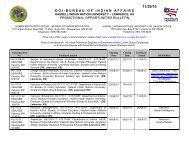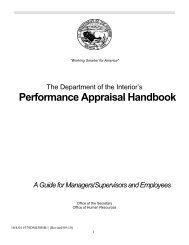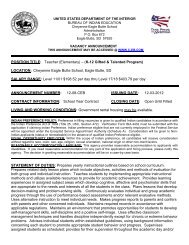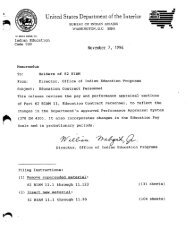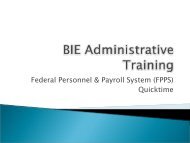collective bargaining agreement contract between - Bureau of Indian ...
collective bargaining agreement contract between - Bureau of Indian ...
collective bargaining agreement contract between - Bureau of Indian ...
Create successful ePaper yourself
Turn your PDF publications into a flip-book with our unique Google optimized e-Paper software.
Section 7. RecallEmployees participating in telework/telecommute programs must be accessible and available for recallto their regular <strong>of</strong>fices for work needs that cannot be performed at the alternate worksite. Examples aretraining, special meetings, new work requirements, and emergencies. These examples are for illustrativepurposes and are not meant to be all-encompassing. Management will take full advantage <strong>of</strong> existingtechnology (teleconference, fax, etc.) where possible in order to minimize recall. Management willprovide reasonable advance notice <strong>of</strong> all recalls if possible. Where practicable, not less than 24 hoursadvance notice will be given but there may be times when advance notice cannot be given.Section 8. TravelA. Travel provisions that apply to employees working at a traditional worksite also apply toemployees who telework. A teleworker who is directed to travel to another worksite (includingthe traditional worksite) during his or her regularly scheduled basic tour <strong>of</strong> duty would have thetravel hours credited as hours <strong>of</strong> work. If the employee is directed to report to the <strong>of</strong>ficial dutystation, the travel will be at no cost to the Government.B. Where an employee teleworks full-time from a location outside <strong>of</strong> the local commuting area <strong>of</strong>the traditional worksite, and his or her alternative worksite has been determined as his or her<strong>of</strong>ficial duty station, the employee’s organization would be responsible for all work-related traveloutside the employee’s normal commuting area, including travel to the traditional worksite.Section 9. TerminationA. Supervisors may terminate an <strong>agreement</strong> whenever:(1) There is a change in work requirements or the arrangement no longer supports themission.(2) An employee's performance is less than Fully Successful at the progress review or at theend <strong>of</strong> the annual appraisal period, or if, within at least sixty (60) work days, theemployee has demonstrated an inability to work alone and without face-to-facesupervision.(3) The employee has demonstrated conduct problems regarding trustworthiness ordependability to the extent that he/she should be removed from the program.(4) Costs <strong>of</strong> the <strong>agreement</strong> are no longer affordable.(5) Technology changes require return to the regular <strong>of</strong>fice.(6) Employees do not conform with the terms <strong>of</strong> their <strong>agreement</strong>.B. When terminating a telework/telecommute arrangement, the following must occur:53





